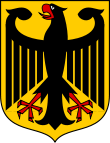- German People's Party
-
This article is about the German People's Party which existed between 1918 and 1933. For the party with same name, which existed between 1868 and 1910, see German People's Party (1868). For the party which existed in Romania between 1935 and 1938, see German People's Party (Romania).
German People's Party
Deutsche VolksparteiFounded 1918 Dissolved 1933 Preceded by National Liberal Party Succeeded by after 1945:
Free Democratic Party,
Christian Democratic Union
(West Germany)
Liberal Democratic Party,
Christian Democratic Union (East Germany)Newspaper NA; supported by Kölnische Zeitung Ideology National liberalism, Monarchism,
Classical liberalism,
Liberal conservatism, moderate NationalismPolitical position Centre-Right International affiliation None Official colors black-white-red
(imperial colors)Politics of Germany
Political parties
ElectionsGermany 
This article is part of the series:
Politics and government of
GermanyConstitutionExecutiveLegislatureJudiciaryDivisions- States (Länder)
- Administrative regions
(Regierungsbezirke) - Districts (Kreise)
- Collective municipalities
- Municipalities (Gemeinden)
ElectionsForeign policy
The German People's Party (Deutsche Volkspartei, or DVP) was a national liberal party in Weimar Germany and a successor to the National Liberal Party of the German Empire.
Contents
Ideology
It was essentially the right wing of the old National Liberal Party, and was formed in the early days of the Weimar Republic, led by Gustav Stresemann. During the Weimar Republic, it was one of two large liberal parties in Germany, the other being the German Democratic Party.
The party was generally thought to represent the interests of the great German industrialists. Its platform stressed Christian family values, secular education, lower tariffs, opposition to welfare spending and agrarian subsides and hostility to "Marxism" (that is, the Communists, and also the Social Democrats). Due to its lukewarm acceptance of democracy, the party was initially part of the "national opposition" to the Weimar Coalition. However, Stresemann gradually led it into cooperation with the parties of the center and left. The party wielded an influence on German politics beyond its numbers, as Stresemann was the Weimar Republic's only statesman of international standing. He served as foreign minister continuously from 1923 until his death in 1929 in nine governments (one of which he briefly headed in 1923) ranging from the center-right to the center-left. After Stresemann's death, the DVP gradually moved back towards the right.
Although the party was considered a liberal party in the Weimar Republic, its policies would appear conservative, by modern European standards.
History
The party's dispute with the Social Democrats in 1930 over unemployment benefits toppled the Grand Coalition government of Hermann Müller. In the election of September 1930, the DVP was one of the biggest losers, losing 15 of its 45 parliamentary seats. The DVP abolished itself in March 1933 after the Nazis came to power in January 1933.
Former elements of the DVP were involved in the creation of the Free Democratic Party after the Second World War.
Notable members
See also
- Liberalism
- Contributions to liberal theory
- Liberalism worldwide
- List of liberal parties
- Liberal democracy
- Liberalism in Germany
- Elections in the Free State of Prussia
- Wilhelm Adam (member from 1926 to 1929)
Preceded by
National Liberal Party (Germany)German liberal parties
1918–1933Succeeded by
Liberal Democratic Party of GermanySucceeded by
Free Democratic Party of GermanyPolitical parties in Germany in the Weimar Republic (1918–1933) Communist Catholic Agrarian - Bavarian Peasants' League (BB)
- Agricultural League
- Schleswig-Holsteinische Bauern- und Landarbeiterdemokratie (SHBLD)
- Christian National Peasants' and Farmers' Party (CNBL)
- German Farmers' Party (DBP)
Liberal - German Democratic Party (DDP)
- German People's Party (DVP)
- German State Party (DStP)
Conservative - German National People's Party (DNVP)
- People's Right Party (VRP)
- Christian Social People's Service (CSVD)
- Conservative People's Party (KVP)
Fascist Miscellaneous Categories:- Political parties in Germany
- Defunct liberal political parties
- Political parties in Weimar Germany
- Defunct political parties in Germany
- Liberal parties in Germany
- European Liberal party stubs
- German political party stubs
Wikimedia Foundation. 2010.
